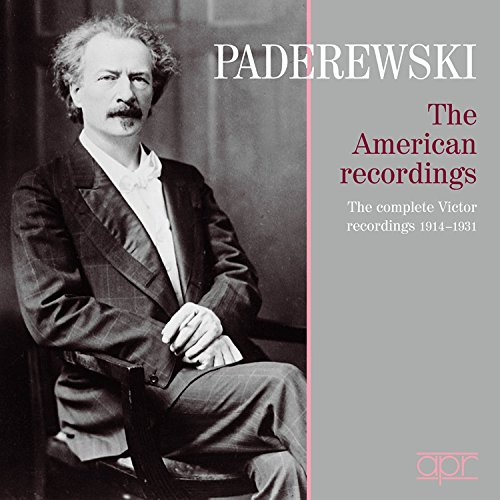Paderewski: The Complete Victor Recordings
View record and artist detailsRecord and Artist Details
Genre:
Instrumental
Label: APR
Magazine Review Date: 12/2016
Media Format: CD or Download
Media Runtime: 397
Mastering:
ADD
Catalogue Number: APR7505

Author: Patrick Rucker
APR’s new issue of the Victor recordings made between 1914 and 1931 compliments two previous sets of Paderewski’s earliest recordings (5/08) and final recordings (2/10). In one of two informative booklet essays, producer Mark Obert-Thorn describes the challenges inherent in the project, not the least of which was sorting through a thicket of conflicting or erroneous discographic sources. Predictably the transfers are excellent.
Paderewski’s Chopin interpretations are so well known that any detailed description is probably redundant, though several outstanding performances warrant mention. Very much to the manner born, four Mazurkas – Opp 17 No 4 (1923), 59 Nos 2 and 3 (1924), and 33 No 2 (1930) – are direct and charmingly poetic. The E flat minor Polonaise, Op 26 No 2 (1930), is a worthy companion to the grandeur of the aforementioned Polonaise militaire (1917), and several Nocturnes exude a fin de siècle perfume.
Probably the most justly admired of Paderewski’s Liszt interpretations is the Hungarian Rhapsody No 10 (1922). The glissandos are ethereally light, and the flowing legato of the fioritura is wrought with a delicacy that unfortunately has all but disappeared from today’s pianistic vocabulary. Similar finesse permeates the haunting ‘La leggierezza’ (1923) though, in this instance, wed to a dervish. A beautifully paced Spinning Chorus from The Flying Dutchman (1924; 1930) belongs on any shortlist of fine Wagner transcriptions. On the other hand, ‘La campanella’ (1926; 1927), or at least the version of it Paderewski plays, never seems far from collapse.
If Schumann’s ‘Vogel als Prophet’ (1926) and ‘Nachtstück’, Op 23 No 4 (1928) are captivating, a plaintive ‘Warum?’ (1914) is positively disarming. Richly atmospheric accounts of ‘Reflets dans l’eau’ (1924) and four Préludes from Book 1 (1930) testify to Paderewski’s perceptive grasp of Debussy.
Two Rachmaninov Preludes, in C sharp minor (Op 3 No 2) and G sharp minor (Op 32 No 12), are puzzling. Paderewski makes the odd interpretative choice of strumming the chords in the upper staves in the beginning of Op 3 No 2, inevitably trivialising the sombre texture, and crashes through both pieces as though in a rage. These recordings were made less than a year after the joint invasion of Poland by Nazi Germany and the USSR. Unlikely as it seems, could the 79-year-old Pole have been venting his patriotic spleen on the music of his younger colleague, even though Rachmaninov too was an émigré?
Of course there is much more of interest in these six and a half hours of recorded music. In addition, Paderewski speaks about the golden anniversary of his American debut in two bonus tracks.
In 1963 Harold Schonberg wrote that Paderewski ‘would not be allowed to graduate from a reputable conservatory today’. But since then our understanding of historical pianism has broadened. Even as critical esteem waned, Paderewski never lost his hold on the public. Perhaps a re-evaluation is in order, and this new APR set, with its wonderful transfers giving us an unprecedentedly vivid idea of Paderewski’s vaunted ‘golden touch’, could well be a catalyst.
Discover the world's largest classical music catalogue with Presto Music.

Gramophone Digital Club
- Digital Edition
- Digital Archive
- Reviews Database
- Full website access
From £8.75 / month
Subscribe
Gramophone Full Club
- Print Edition
- Digital Edition
- Digital Archive
- Reviews Database
- Full website access
From £11.00 / month
Subscribe
If you are a library, university or other organisation that would be interested in an institutional subscription to Gramophone please click here for further information.




